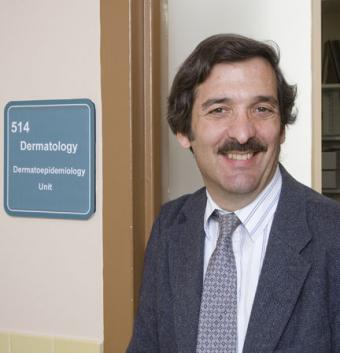Martin Weinstock, dermatologist at the Providence VA Medical Center and professor of dermatology and community health at the Warren Alpert Medical School of Brown University, has received $10 million from the Veterans Affairs Cooperative Studies Program for his four-year trial on skin cancer prevention.
More than half of the incidences of cancer in the United States are skin cancer, Weinstock says – more than 1 million cases per year, including 100,000 cases annually in the VA.
Weinstock’s study addresses the basal cell and squamous cell carcinomas, not often fatal like melanomas but potentially dangerous or disfiguring.
“It can destroy your eye, it can destroy your ear, it can destroy your nose,” Weinstock says. “It can grow into your skull, into your carotid artery. Once you have had one of these cancers, you’re at increased risk to have another, and the more times you have had it, the higher the risk of you developing even more.
“The standard of care is to surgically remove them,” Weinstock said. “So with high-risk populations, the approach is to wait until the next one is diagnosed, then cut; wait, then cut; wait, then cut.”
The four-year trial hopes to overturn the wait-and-cut model in favor of a treatment that may prevent new skin cancers altogether.
The potentially preventative agent being tested – 5-Fluourouracil – already is used topically for actinic keratoses, rough pink spots of skin that may turn into skin cancer.
Weinstock has proposed that applying the 5-FU cream to the face and ears twice a day for several weeks could actually prevent the appearance of skin cancer. Side effects will likely include redness, itching or pain in the treated areas.
The trial group of 1,000 patients is at high risk for skin cancer recurrence, each member having at least two carcinomas in the last five years, at least one of which was on the face or ears. The patients will be drawn from 12 VA clinical centers around the United States, randomly given the 5-FU cream or a control, and monitored from two to four years.
The best hope? “Patients who are randomized to receive the cream will get no skin cancers,” Weinstock said, “but it’s unlikely that there will be that dramatic an effect. A more reasonable expectation is substantial reductions for maybe a period of a few years. If people use the treatment every three years, their risk of skin cancer may be reduced by more than 50 percent.”
“A million cases a year, cut in half? That’s huge,” Weinstock said.
The study also will assess quality of life and cost of care. Weinstock’s team says that if it proves effective, this treatment will ultimately save money for the VA and for health systems nationwide.
Weinstock said 5-FU has been available for a long time, though it has not been tested for this particular purpose. The medicine is off patent and could be produced by any company.
This material is based upon work supported (or supported in part) by the Office of Research and Development Rehabilitation R&D Service, Department of Veterans Affairs.

